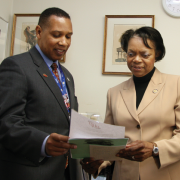|
 For UUP, the $131.8 billion 2009-10 state budget is like a partly cloudy day. The outlook could be much brighter, but given the state’s fiscal climate, the budget could have been equivalent to a severe storm. For UUP, the $131.8 billion 2009-10 state budget is like a partly cloudy day. The outlook could be much brighter, but given the state’s fiscal climate, the budget could have been equivalent to a severe storm.
“The new budget increases SUNY’s net operating budget by $40 million, a positive step in a time of economic turmoil for the state,” UUP President Phillip Smith said. “But the spending plan does not address all our concerns, including the future of SUNY’s hospitals.”
Smith is especially pleased state leaders approved the proposal championed by UUP to create a $75 million supplemental operating account derived from the University’s reserves which will be used to prevent any further erosion of academic quality.
“This fund will help allow the University to retain and hire the full-time faculty needed to teach and assist the soaring numbers of students seeking admission to SUNY,” Smith said. “These funds will help protect students and their families by ensuring the faculty will be there to teach required courses that would otherwise be cancelled, averting the possibility of delayed graduations.”
The state Legislature stood up to protect UUP members by rejecting the governor’s proposal to eliminate the negotiated 3 percent salary increase slated to begin April 1. Lawmakers also turned back proposals to establish a five-day pay deferral and a new Tier V pension plan for future state employees.
Unfortunately, the budget picture is a bit cloudier for UUPers working at SUNY’s three hospitals in Brooklyn, Stony Brook and Syracuse. The spending plan fails to restore $25 million trimmed from the SUNY hospitals state subsidy. The state plans to use that loss to leverage a $48 million increase in new federal funds for the hospitals over the next two years.
On another issue, UUP is heartened by efforts to allow SUNY to retain more of the revenue it collects from higher tuition rates. The budget agreement allows SUNY to retain 50 percent of the increased tuition revenue in three years, up from the current 20 percent.
“We hear the calls from those who wonder why SUNY can’t keep 100 percent of the additional tuition revenue,” Smith said. “But at the same time, we know that things are moving in the right direction away from the days when all of SUNY’s past tuition increases were swallowed up by decreases in state support.”
Smith is also pleased the Legislature refused to adopt the governor’s proposal to merge the New York State Theatre Institute with The Egg.
“We warned the proposed merger would have ultimately led to the end of NYSTI,” Smith said. “Now, NYSTI can continue to provide professional quality theatre arts education and performances to students and the public.”
UUP scored other victories in the budget, including:
• The rejection of proposals allowing SUNY campuses to sell or lease their property, or so-called “flexibility;”
• Denial of a requirement that both state employees and retirees pay a portion of their Medicare Part B premiums, and
• The refusal to allow campuses to charge differential tuition for out-of-state students.
Smith thanked the many UUPers who participated in the union’s advocacy effort, but warned that changes in the state’s financial forecast could prompt the need for more activity.
“In these tough fiscal times, proposals like Tier V and the merger of NYSTI could resurface, so we have to remain vigilant and be ready to fight another day,” Smith said.
— Donald Feldstein
|


